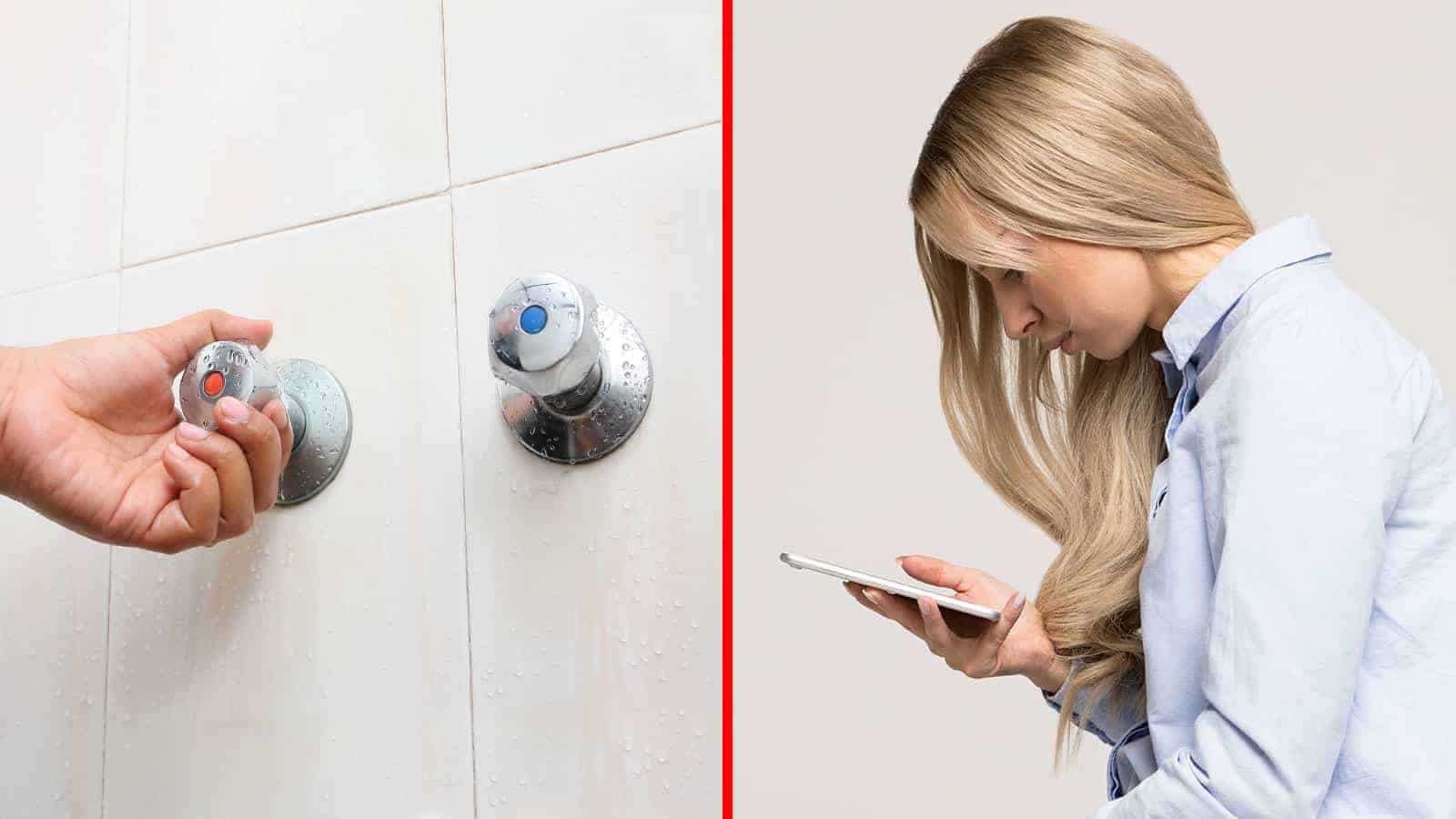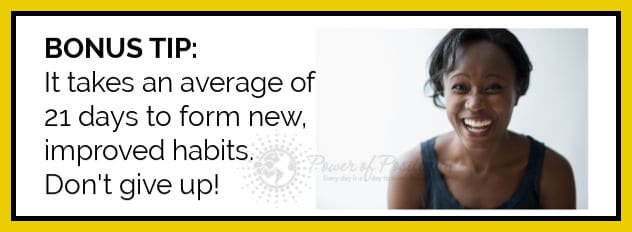What daily habits might be doing more harm than good?
Developing a bad habit can be a challenge to overcome. This often happens because:
- These habits become deeply rooted in our neural networks, and
- We sometimes find it tough to accept and rectify our own mistakes.
However, this isn’t a reflection on an individual’s character; it’s a universal human tendency. Sometimes we inadvertently adopt habits that might not be in our best interest.
Interestingly, some habits are so ingrained in our daily routines that we don’t even recognize them as ‘habits.’ Yet, they can impact us, occasionally even our health.
In this article, we will highlight 11 everyday habits that people might be getting wrong. These habits are so prevalent that many of us have likely fallen into these patterns at some point.
Lastly, we’ll introduce a concept called ‘effortless mindfulness’ to help navigate these habits better. Let’s explore!

The 11 Simple Daily Habits
Here are the 11 simple daily habits people do wrong without realizing it.
1 – Using digital screens before bed
“Staring at smartphones before bed is a good idea,” said nobody ever.
Despite the commonsense idea to keep cell phones, tablets, and laptops out of one’s sleeping space, countless millions of people do it anyway.
This is a double whammy. First, it’s estimated that over 50 percent of adults worldwide don’t get enough sleep. The number jumps to over 60 percent in Western nations. Second, studies roundly demonstrate that blue light emission completely jacks with your body’s circadian rhythm. So, when you want to catch up on sleep, your body will have a harder time complying.
What to do:
- Stop using your phone or tablet at least one hour before the time you wish to sleep.
- Read a paperback book instead.
- Activate your phone or tablet’s blue light or “night shift” feature.
2 – Defrosting meat at room temperature
According to the United States Department of Agriculture (USDA), thawing meat at room temperature or under hot water is not a good idea.
Products like eggs, poultry, cooked or raw meat, and other perishables must be kept at a temperature above 40 degrees Fahrenheit (~4.4 degrees Celsius) to prevent foodborne illness.
Moreover, the USDA says perishable foods should not be thawed on the counter or in hot water for longer than two hours. So, leaving a chicken out to thaw when you’re at work isn’t a good idea either.
What to do:
- Thaw your perishables using one of three methods – in cold water, the microwave, or the refrigerator.
3 – Drinking coffee first thing
Uh, now’s your chance to skip over this one, early birds. Okay, you asked for it.
Apparently, the production of cortisol in the body is high in the morning. Usually, this would be considered a good thing. Cortisol does have the dubious title of “stress hormone,” after all.
However, this cortisol can be a viable energy source in the morning. It is also a vital component of our circadian rhythm, which ensures that we fall asleep and wake up at a standard, set time every day.
Coffee – and caffeine in general – interferes with these cortisol functions. Our body begins to rely on caffeine to perform the energy-boosting functions previously reserved for cortisol.
What to do (but you probably won’t!):
- Wait an hour or two before downing the java.
4 – Washing ‘prewashed’ greens
We wash our lettuce, celery, spinach, and other ‘greens’ for a good reason. Should we do the same with ready-to-eat produce?
The answer appears to be “No.” According to a 2007 study published in the journal International Association for Food Protection, re-washing ready-to-eat, prewashed greens increases the risk of contracting foodborne illness.
The reason is quite simple. Improper handwashing is the leading cause of foodborne illness, and most people don’t correctly wash their hands. Apparently, this risk is greater than the pre-washed greens being tainted.
What to do:
- Eat the greens out of the box
- Wash your hands thoroughly with warm water for two minutes before rinsing greens.
5 – Holding a sneeze
Um, don’t hold your nose and sneeze. Among the things that could happen:
- Ruptured throat
- Punctured eardrum
- Air trapped in the chest
- Cerebral aneurysm
In one instance, a 34-year-old man was hospitalized for seven days after clamping his mouth and nose during a sneeze. Doing so, ruptured his throat and caused air bubbles to enter the deep muscle tissues. Due to the swelling of the neck all the way to the ribcage, doctors had to feed him with by tube and administer IVs until it eased.
What to do:
Sneeze into a tissue or, if necessary, your hands.
6 – Holding in flatulence
Let’s talk about flatulence as long as we’re discussing air escaping our orifices. Farts, for short.
Anyways, this isn’t a good idea either. Gas needs to be passed, one way or another. Holding it in places tremendous pressure on the abdomen and can even cause distension.
What to do:
- Let your gas rip.
- Blame someone else.
7 – Staring down at your phone
The spine evolved as it did for a reason. Slouching, bending, and otherwise, poor posture is unnatural and harmful.
Still, that doesn’t stop billions of people from staring down at their smartphones for hours on end. Many people develop what Dr. DL Fishman calls a text neck or “repeated stress injury and pain” in the neck caused by excessive cell phone use.
What to do:
- When using your smartphone, exert a bit of effort and hold it straight out in front of you.
8 – Not using cold water in the shower
Not ending a shower with 10 to 30 seconds of cold water isn’t exactly a “habit” that people do wrong – but that doesn’t mean it isn’t really healthy.
According to Dr. Kaley Burns, ending your shower with cold water brings the following benefits:
- Assist injury recovery
- Improve circulation
- Improve lymphatic system health
- Increase energy (IMHO: the best benefit!)
- Promote healthy skin
- Reduce stress
- Strengthen the immune system
What to do:
- Shower at your desired water temperature, per usual. Before ending the shower, reserve 10 seconds for a cold rinse. If you’re willing, work your way up to 30 seconds.
9 – Not washing your face before working out
If you wear makeup and don’t wash it off before breaking a sweat, you’re not doing your skin any favors. Makeup debris settles in, saturating the pores during a workout session. In turn, it can trigger or exacerbate breakouts.
What to do:
Use a makeup remover first, and then thoroughly rinse your face with warm water. Use a toner if you’d like.
10 – Overuse of antibacterial products
Notice the word overuse. We’re not saying that you shouldn’t use antibacterial products. The problem is when you’re constantly submerging your hands with anti-bacterial sanitizers and soaps.
Why is it a problem? Research shows that antibacterial products leave residues on the skin’s surface. This can create a sort of safe haven for bacteria to dwell and multiply.
Moreover, the chemical triclosan, found in most antibacterial products, may trigger a genetic mutation and cause the targeted bacteria to become immune.
What to do:
– Normal soap is just as effective at killing bacteria than antibacterial products. If you can, use it more often.
11 – Using headphones at max sound
We all love our music. Especially when our favorite tune comes on at just the right time. By all means, “turn it up.” Just don’t blare the music directly into your ears on the regular.
Science shows that exposing your ears to excessive noise via headphones can cause noise-induced hearing loss or NIHL. Unfortunately, our youngsters may be the most at-risk. Per the American Osteopathic Association (AOA), 1 in 5 teenagers will experience hearing loss. A 30% higher rate than it was 20 years ago.
What to do: Per the AOA, people should not exceed 60 percent of the maximum volume while using headphones.
Final thoughts: Effortless mindfulness
“Effortless mindfulness is the letting go of attention, though, and present moments to open an already awake awareness that is naturally focused, compassionate, and non-conceptually intelligent in the Now.” – Loch Kelley
Most people live their lives on automatic pilot. A perpetual state of busyness. It’s so commonplace that it’s become our default mode of living. It’s ‘normal – it’s also insane.
Such a mode of operation causes us to form bad habits. We become negative energy and live in a state of constant stress.
The thing is: we don’t have to live like this.
Another thing: you can live effortlessly.
While it’s beyond the scope of this article to give an entire discourse on mindfulness, here’s a brief foray into something called ‘effortless mindfulness.’
The notion of effortlessness sounds absolutely insane to most of us. We’re told we must “try harder” when we first enter a classroom. Eventually, we’re programmed to think and believe that constant effort and striving are the gateway to happiness and success.
This is simply untrue.
Enter effortless mindfulness. Effortless mindfulness is a term coined by meditation teacher and mindfulness coach Loch Kelley.
Effortless mindfulness is rooted in the ancient wisdom traditions often described as direct path, essence traditions, or nondual traditions. The basic idea is, according to Kelley, “that the awake loving nature we are seeking is already here within us and can be accessed immediately.”
If you’re a student or practitioner of Buddhism or Taoism, you may have heard of effortless mindfulness in different terms. Buddhists and students of Buddhism tend to use the terms non-meditation. Taoists call it Wu Wei.
But effortless mindfulness has nothing to do with spirituality, religiosity, or belief. But it must be cultivated. That is, an initial effort is required, though probably not the ‘effort’ of the likes you are thinking.
You see, effortless mindfulness has nothing to do with thinking. On the contrary, it has everything to do with silence. Allowing your true self to surface. The true self is underneath the layers of mental concepts, chronic tension, and the general sense of unease.
The foundations? There are three.
- Completely relax your mind and body. This brings to the surface your non-conceptual intelligence and true self.
- Remain in this state.
- When #2 disappears, go back to #1.
May you remain as your best self. Your effortless self.



















